Special Report
States Getting the Most COVID-19 Vaccines From the Federal Government
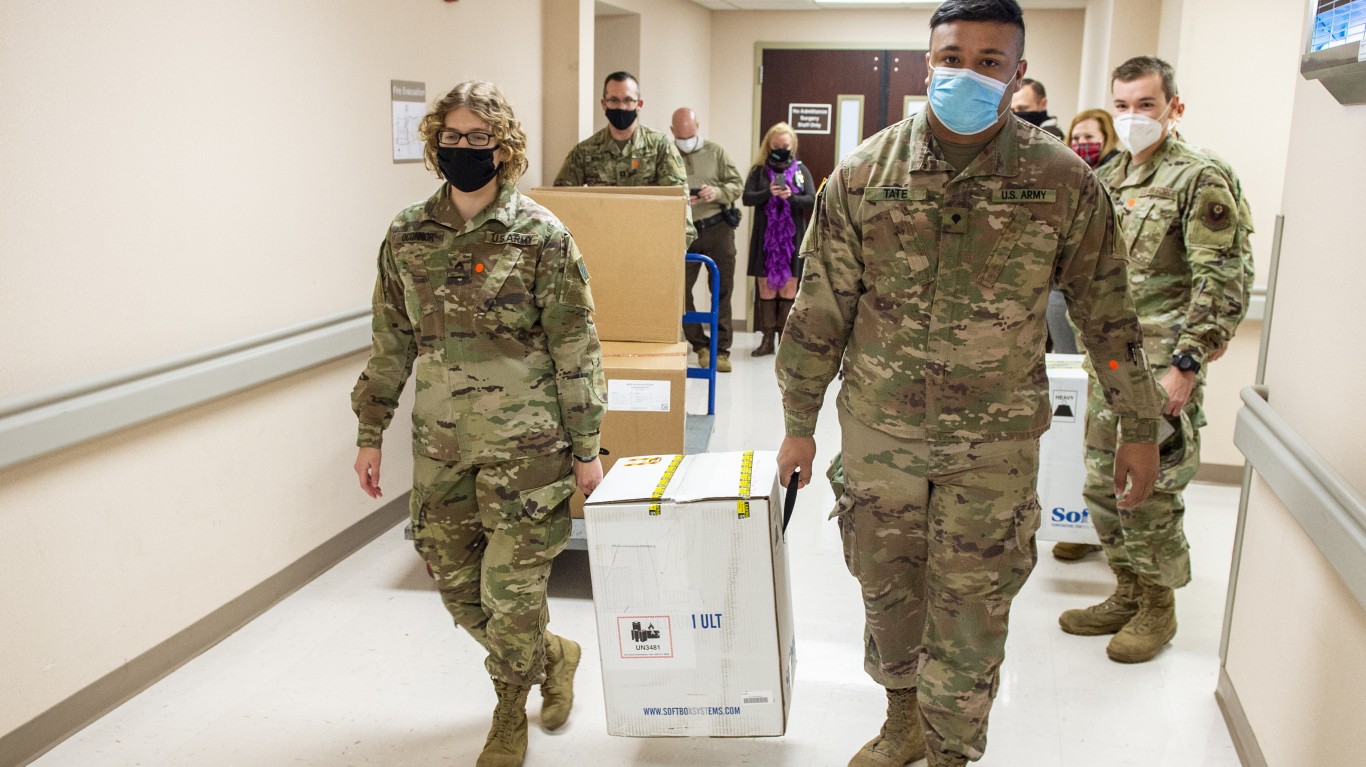
Published:

It has now been 12 weeks since the first shipments of the COVID-19 vaccine were sent out to states, kicking off the largest vaccination campaign in human history. As of Mar. 9, 123,232,775 doses of the vaccine have been sent out across the country — equivalent to 37.7% of the U.S. population.
While the distribution of the vaccine is taking longer than initial federal projections had indicated, some states are faring far better than others. Under the current system, named Operation Warp Speed, the Centers for Disease Control and Prevention sends states limited shipments of the vaccine as well as funding and tasks them with distributing the vaccine in accordance with relatively loose federal guidelines. The initial distribution of the vaccine is based on the size of the adult population in every state, which — according to some experts — can create inequities in states where a larger share of the population is at risk.
At this stage of the vaccine rollout, distribution of the vaccine varies widely from state to state. While the CDC has so far sent out an average of 37,666.60 vaccine doses per 100,000 Americans, Alaska has received 58,403 doses per 100,000 residents — the most of any state. Meanwhile, Utah has received 33,351 doses per 100,000, the fewest of any state.
While the distribution of the vaccine is determined by a formula based on the size of the adult population in each state, smaller states have so far received an outsized allotment of doses. As of Mar. 9, the 10 smallest states have received an average of 43,054 doses of the vaccine per 100,000 residents. In comparison, the 10 largest states have received an average of 36,837 doses per 100,000 residents.
While the federal government distributes vaccines to states, it is up to state governments to administer the vaccine — creating variations in both the percentage of vaccines that have been administered and the percentage of the population that has been vaccinated. In North Dakota, 87.2% of vaccine doses have been administered, the most of any state and far greater than the 76.0% national average. In Georgia, 64.9% of vaccine doses have been administered, the least of any state.
At this stage of the rollout, the number of doses administered in Alaska is equivalent to 41.0% of the state population — the largest share of any state. The lowest vaccination rate is in Georgia, where 22.9% of residents have received a dose of the vaccine. Nationwide, the number of doses administered is equivalent to 28.6% of the U.S. population.
While a majority of Americans remain unvaccinated due to a lack of supply, there are some who have no plans to receive a vaccine at all. According to a survey from the U.S. Census Bureau, 24.9% of U.S. adults 18 and over who have not yet received the vaccine will either probably not or definitely not get a COVID-19 vaccine in the future. The most common reason cited for not wanting a vaccine was being concerned about possible side effects. Other commonly cited reasons include that they were planning to wait and see if it is safe, that other people need it more right now, and not trusting COVID-19 vaccines.
To determine the states getting the most vaccines from the federal government, 24/7 Wall St. reviewed data from the Centers for Disease Control and Prevention. States were ranked based on the number of vaccines administered as of Mar. 9 per 100,000 residents. Vaccine counts were adjusted for population using one-year data from the Census Bureau’s 2018 American Community Survey. Data on confirmed COVID-19 cases as of Mar. 9 came from various state and local health departments and were adjusted for population using 2018 ACS data. Data on the percentage of adults who probably will not or definitely will not get a COVID-19 vaccine and their reasons for not getting one came from the Census Bureau’s Household Pulse Survey, conducted from Feb. 17, 2021 to Mar. 1, 2021.

50. Utah
> Vaccines distributed per 100,000: 33,351
> Vaccinations administered as pct. of population: 27.8% (13th fewest)
> COVID-19 cases per 100,000 residents: 11,790 (3rd most)
> Population: 3,161,105
These are all the counties in Utah where COVID-19 is slowing (and where it’s still getting worse).

49. Missouri
> Vaccines distributed per 100,000: 33,355
> Vaccinations administered as pct. of population: 26.9% (8th fewest)
> COVID-19 cases per 100,000 residents: 7,855 (13th fewest)
> Population: 6,126,452

48. Texas
> Vaccines distributed per 100,000: 33,778
> Vaccinations administered as pct. of population: 25.4% (4th fewest)
> COVID-19 cases per 100,000 residents: 9,389 (23rd most)
> Population: 28,701,845
These are all the counties in Texas where COVID-19 is slowing (and where it’s still getting worse).

47. Alabama
> Vaccines distributed per 100,000: 34,556
> Vaccinations administered as pct. of population: 23.3% (2nd fewest)
> COVID-19 cases per 100,000 residents: 10,242 (12th most)
> Population: 4,887,871

46. Tennessee
> Vaccines distributed per 100,000: 34,637
> Vaccinations administered as pct. of population: 24.6% (3rd fewest)
> COVID-19 cases per 100,000 residents: 11,579 (4th most)
> Population: 6,770,010

45. South Carolina
> Vaccines distributed per 100,000: 34,942
> Vaccinations administered as pct. of population: 27.5% (9th fewest)
> COVID-19 cases per 100,000 residents: 10,372 (11th most)
> Population: 5,084,127

44. Idaho
> Vaccines distributed per 100,000: 35,229
> Vaccinations administered as pct. of population: 27.9% (16th fewest)
> COVID-19 cases per 100,000 residents: 9,880 (16th most)
> Population: 1,754,208
These are all the counties in Idaho where COVID-19 is slowing (and where it’s still getting worse).

43. Georgia
> Vaccines distributed per 100,000: 35,239
> Vaccinations administered as pct. of population: 22.9% (fewest)
> COVID-19 cases per 100,000 residents: 9,760 (18th most)
> Population: 10,519,475

42. Oregon
> Vaccines distributed per 100,000: 35,337
> Vaccinations administered as pct. of population: 29.2% (24th most)
> COVID-19 cases per 100,000 residents: 3,770 (4th fewest)
> Population: 4,190,713
These are all the counties in Oregon where COVID-19 is slowing (and where it’s still getting worse).

41. New Jersey
> Vaccines distributed per 100,000: 35,484
> Vaccinations administered as pct. of population: 29.6% (22nd most)
> COVID-19 cases per 100,000 residents: 9,192 (25th fewest)
> Population: 8,908,520

40. North Carolina
> Vaccines distributed per 100,000: 35,824
> Vaccinations administered as pct. of population: 28.0% (18th fewest)
> COVID-19 cases per 100,000 residents: 8,435 (17th fewest)
> Population: 10,383,620

39. Minnesota
> Vaccines distributed per 100,000: 35,840
> Vaccinations administered as pct. of population: 31.1% (17th most)
> COVID-19 cases per 100,000 residents: 8,770 (20th fewest)
> Population: 5,611,179

38. Virginia
> Vaccines distributed per 100,000: 36,294
> Vaccinations administered as pct. of population: 30.0% (20th most)
> COVID-19 cases per 100,000 residents: 6,905 (9th fewest)
> Population: 8,517,685

37. Mississippi
> Vaccines distributed per 100,000: 36,496
> Vaccinations administered as pct. of population: 26.1% (7th fewest)
> COVID-19 cases per 100,000 residents: 9,978 (15th most)
> Population: 2,986,530
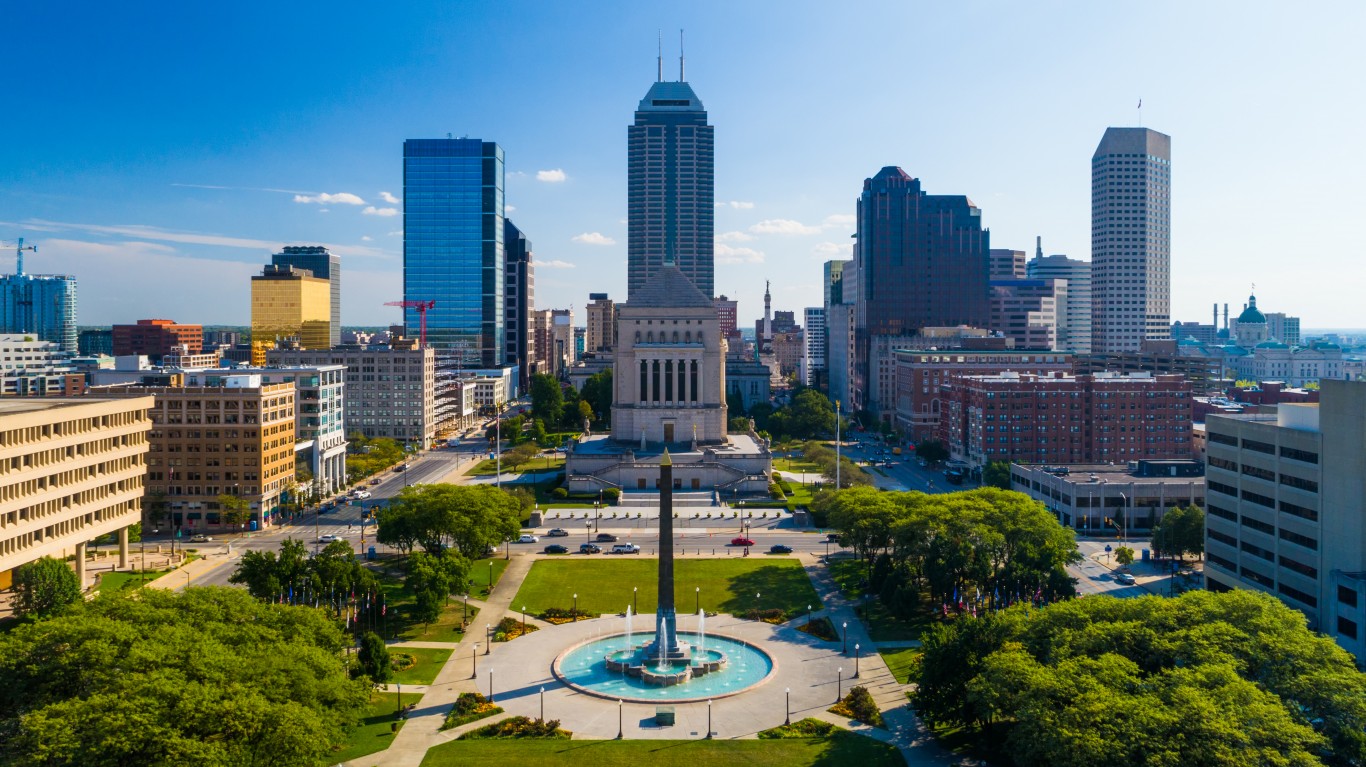
36. Indiana
> Vaccines distributed per 100,000: 36,519
> Vaccinations administered as pct. of population: 28.3% (21st fewest)
> COVID-19 cases per 100,000 residents: 9,987 (14th most)
> Population: 6,691,878

35. New York
> Vaccines distributed per 100,000: 36,575
> Vaccinations administered as pct. of population: 28.3% (20th fewest)
> COVID-19 cases per 100,000 residents: 8,630 (19th fewest)
> Population: 19,542,209

34. Arizona
> Vaccines distributed per 100,000: 36,796
> Vaccinations administered as pct. of population: 31.3% (15th most)
> COVID-19 cases per 100,000 residents: 11,543 (5th most)
> Population: 7,171,646

33. Iowa
> Vaccines distributed per 100,000: 36,822
> Vaccinations administered as pct. of population: 30.2% (19th most)
> COVID-19 cases per 100,000 residents: 10,779 (9th most)
> Population: 3,156,145
These are all the counties in Iowa where COVID-19 is slowing (and where it’s still getting worse).

32. Illinois
> Vaccines distributed per 100,000: 37,013
> Vaccinations administered as pct. of population: 28.3% (19th fewest)
> COVID-19 cases per 100,000 residents: 9,426 (22nd most)
> Population: 12,741,080

31. Ohio
> Vaccines distributed per 100,000: 37,054
> Vaccinations administered as pct. of population: 27.9% (14th fewest)
> COVID-19 cases per 100,000 residents: 8,397 (16th fewest)
> Population: 11,689,442
These are all the counties in Ohio where COVID-19 is slowing (and where it’s still getting worse).

30. Wisconsin
> Vaccines distributed per 100,000: 37,063
> Vaccinations administered as pct. of population: 31.2% (16th most)
> COVID-19 cases per 100,000 residents: 9,759 (19th most)
> Population: 5,813,568

29. Nevada
> Vaccines distributed per 100,000: 37,069
> Vaccinations administered as pct. of population: 28.5% (23rd fewest)
> COVID-19 cases per 100,000 residents: 9,782 (17th most)
> Population: 3,034,392
These are all the counties in Nevada where COVID-19 is slowing (and where it’s still getting worse).

28. Colorado
> Vaccines distributed per 100,000: 37,210
> Vaccinations administered as pct. of population: 29.0% (25th fewest)
> COVID-19 cases per 100,000 residents: 7,676 (12th fewest)
> Population: 5,695,564

27. Maryland
> Vaccines distributed per 100,000: 37,305
> Vaccinations administered as pct. of population: 28.4% (22nd fewest)
> COVID-19 cases per 100,000 residents: 6,432 (7th fewest)
> Population: 6,042,718

26. Louisiana
> Vaccines distributed per 100,000: 37,323
> Vaccinations administered as pct. of population: 27.6% (11th fewest)
> COVID-19 cases per 100,000 residents: 9,333 (24th most)
> Population: 4,659,978

25. Pennsylvania
> Vaccines distributed per 100,000: 37,544
> Vaccinations administered as pct. of population: 27.5% (10th fewest)
> COVID-19 cases per 100,000 residents: 7,442 (11th fewest)
> Population: 12,807,060

24. Kansas
> Vaccines distributed per 100,000: 37,599
> Vaccinations administered as pct. of population: 25.8% (5th fewest)
> COVID-19 cases per 100,000 residents: 10,182 (13th most)
> Population: 2,911,510
These are all the counties in Kansas where COVID-19 is slowing (and where it’s still getting worse).

23. Michigan
> Vaccines distributed per 100,000: 37,603
> Vaccinations administered as pct. of population: 27.9% (15th fewest)
> COVID-19 cases per 100,000 residents: 6,602 (8th fewest)
> Population: 9,995,915

22. New Hampshire
> Vaccines distributed per 100,000: 37,798
> Vaccinations administered as pct. of population: 29.0% (25th most)
> COVID-19 cases per 100,000 residents: 5,681 (6th fewest)
> Population: 1,356,458

21. Kentucky
> Vaccines distributed per 100,000: 37,883
> Vaccinations administered as pct. of population: 29.0% (24th fewest)
> COVID-19 cases per 100,000 residents: 9,199 (25th most)
> Population: 4,468,402

20. California
> Vaccines distributed per 100,000: 38,039
> Vaccinations administered as pct. of population: 27.6% (12th fewest)
> COVID-19 cases per 100,000 residents: 8,866 (21st fewest)
> Population: 39,557,045

19. Arkansas
> Vaccines distributed per 100,000: 38,444
> Vaccinations administered as pct. of population: 26.0% (6th fewest)
> COVID-19 cases per 100,000 residents: 10,796 (8th most)
> Population: 3,013,825

18. Massachusetts
> Vaccines distributed per 100,000: 38,504
> Vaccinations administered as pct. of population: 32.3% (12th most)
> COVID-19 cases per 100,000 residents: 8,582 (18th fewest)
> Population: 6,902,149
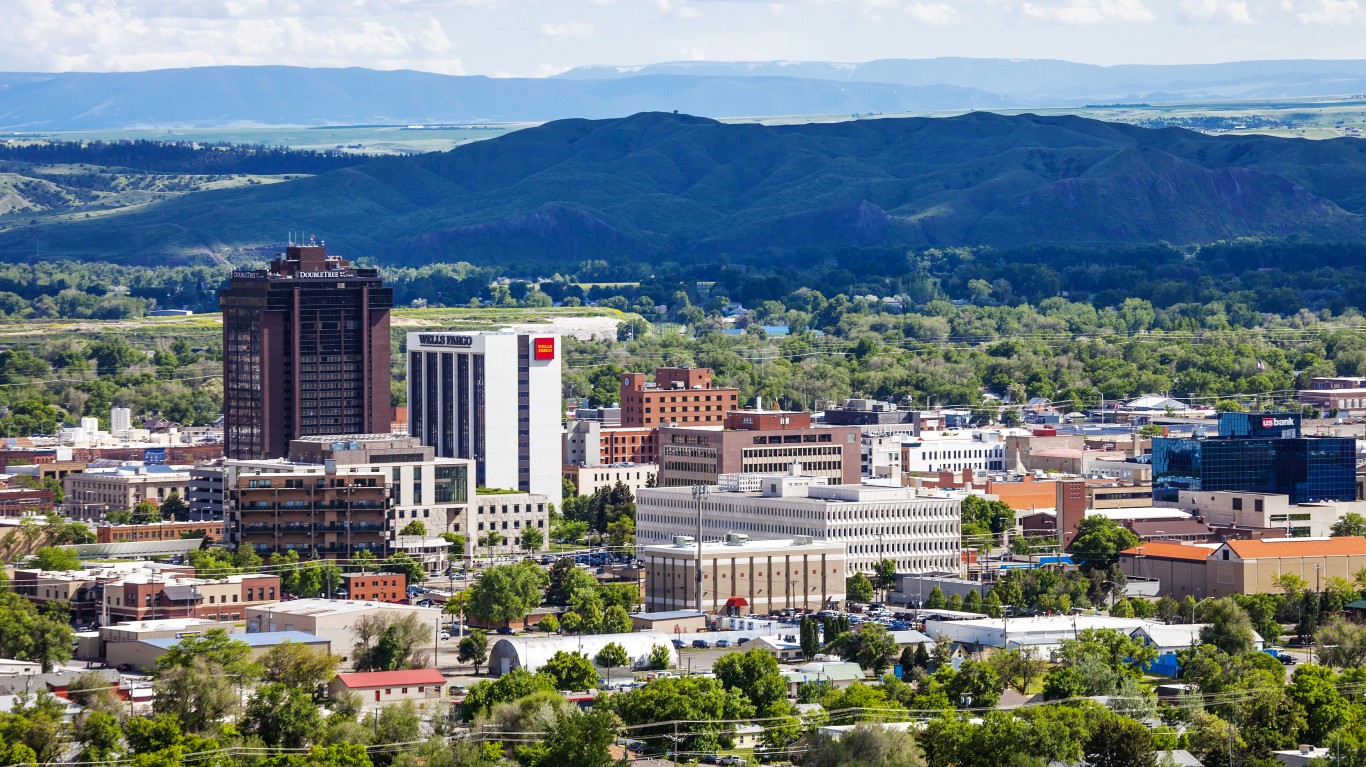
17. Montana
> Vaccines distributed per 100,000: 39,008
> Vaccinations administered as pct. of population: 32.3% (10th most)
> COVID-19 cases per 100,000 residents: 9,516 (20th most)
> Population: 1,062,305

16. Washington
> Vaccines distributed per 100,000: 39,045
> Vaccinations administered as pct. of population: 29.9% (21st most)
> COVID-19 cases per 100,000 residents: 4,588 (5th fewest)
> Population: 7,535,591

15. Florida
> Vaccines distributed per 100,000: 39,697
> Vaccinations administered as pct. of population: 28.0% (17th fewest)
> COVID-19 cases per 100,000 residents: 9,168 (23rd fewest)
> Population: 21,299,325

14. Nebraska
> Vaccines distributed per 100,000: 39,864
> Vaccinations administered as pct. of population: 30.8% (18th most)
> COVID-19 cases per 100,000 residents: 10,537 (10th most)
> Population: 1,929,268

13. Rhode Island
> Vaccines distributed per 100,000: 39,923
> Vaccinations administered as pct. of population: 31.6% (14th most)
> COVID-19 cases per 100,000 residents: 12,227 (2nd most)
> Population: 1,057,315

12. Delaware
> Vaccines distributed per 100,000: 40,243
> Vaccinations administered as pct. of population: 29.5% (23rd most)
> COVID-19 cases per 100,000 residents: 9,169 (24th fewest)
> Population: 967,171

11. Maine
> Vaccines distributed per 100,000: 40,480
> Vaccinations administered as pct. of population: 32.3% (11th most)
> COVID-19 cases per 100,000 residents: 3,441 (3rd fewest)
> Population: 1,338,404
These are all the counties in Maine where COVID-19 is slowing (and where it’s still getting worse).
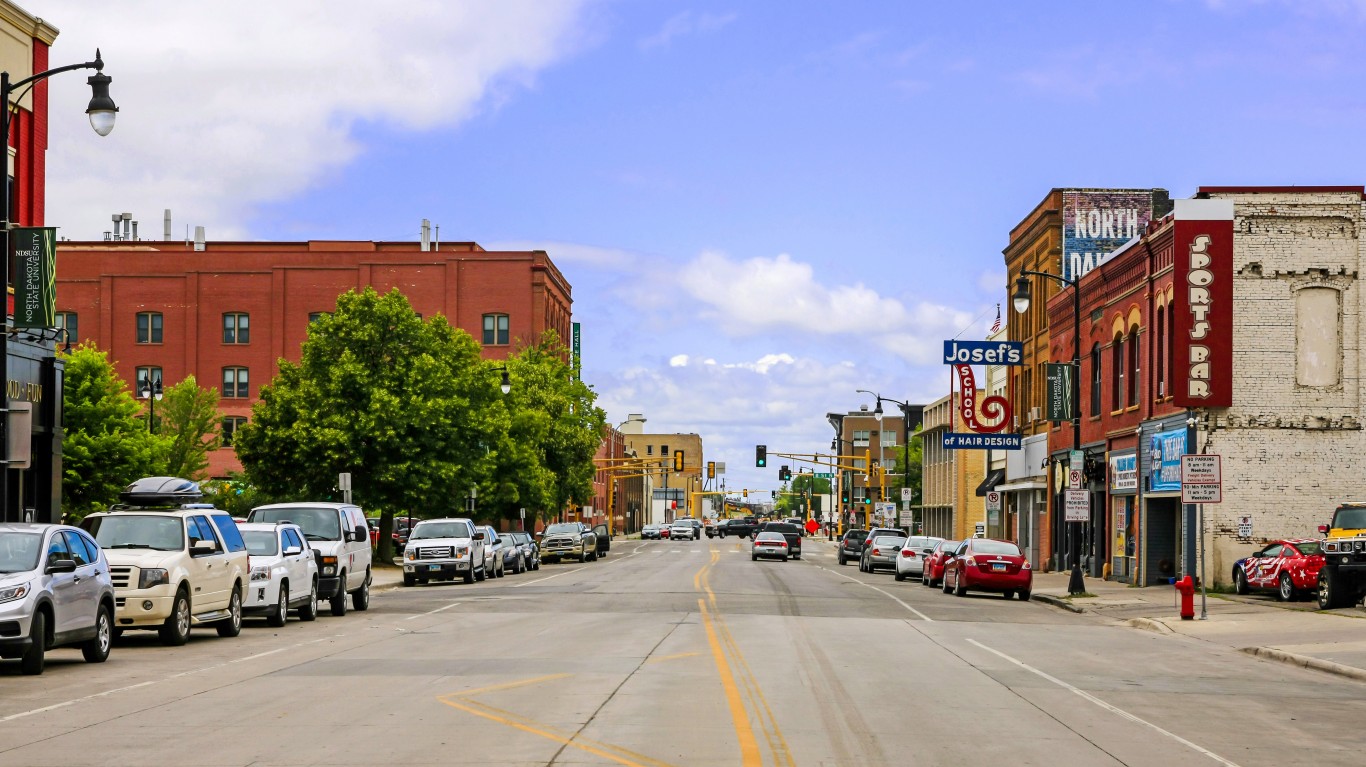
10. North Dakota
> Vaccines distributed per 100,000: 41,908
> Vaccinations administered as pct. of population: 36.6% (4th most)
> COVID-19 cases per 100,000 residents: 13,224 (most)
> Population: 760,077
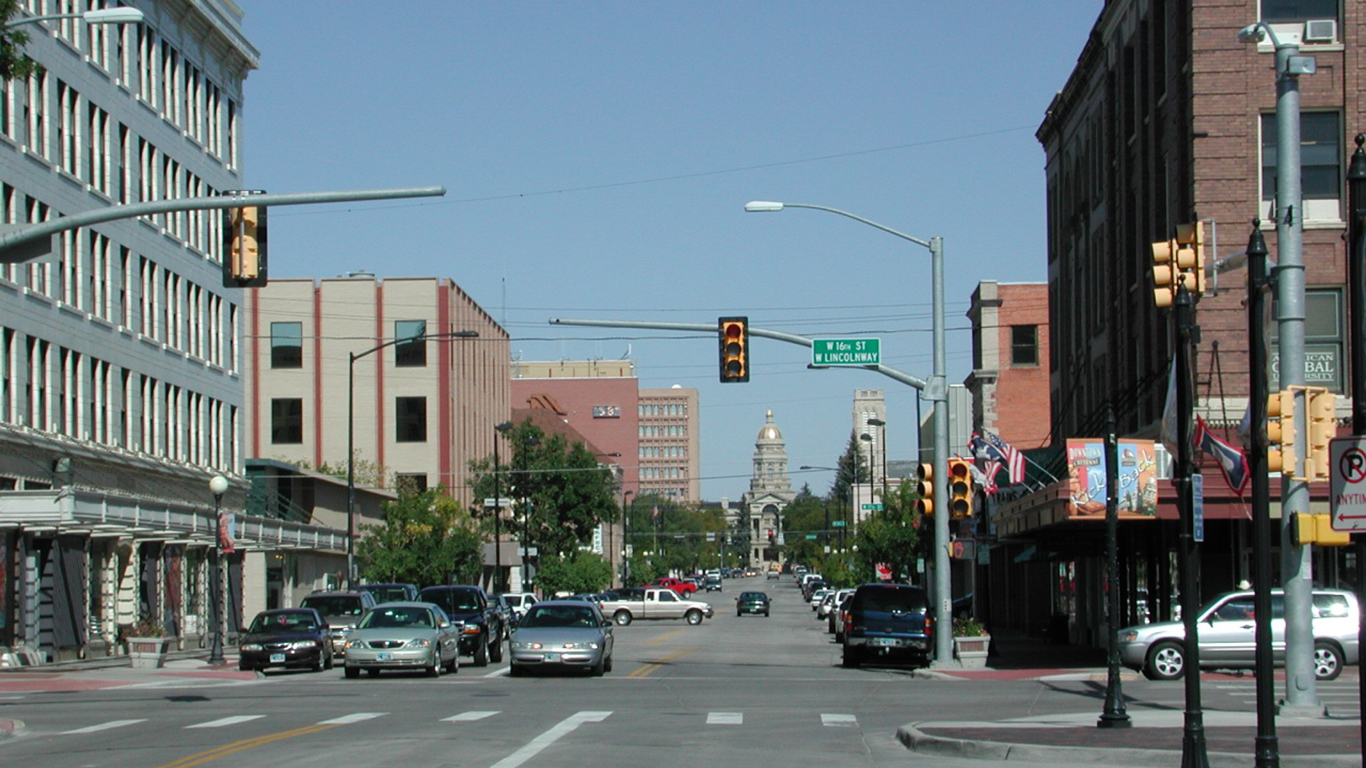
9. Wyoming
> Vaccines distributed per 100,000: 42,602
> Vaccinations administered as pct. of population: 32.2% (13th most)
> COVID-19 cases per 100,000 residents: 9,503 (21st most)
> Population: 577,737

8. Connecticut
> Vaccines distributed per 100,000: 42,711
> Vaccinations administered as pct. of population: 34.9% (5th most)
> COVID-19 cases per 100,000 residents: 8,044 (14th fewest)
> Population: 3,572,665

7. West Virginia
> Vaccines distributed per 100,000: 42,813
> Vaccinations administered as pct. of population: 33.6% (6th most)
> COVID-19 cases per 100,000 residents: 7,412 (10th fewest)
> Population: 1,805,832

6. Vermont
> Vaccines distributed per 100,000: 43,514
> Vaccinations administered as pct. of population: 32.6% (9th most)
> COVID-19 cases per 100,000 residents: 2,600 (2nd fewest)
> Population: 626,299

5. Oklahoma
> Vaccines distributed per 100,000: 44,245
> Vaccinations administered as pct. of population: 33.2% (7th most)
> COVID-19 cases per 100,000 residents: 10,891 (7th most)
> Population: 3,943,079

4. Hawaii
> Vaccines distributed per 100,000: 44,500
> Vaccinations administered as pct. of population: 32.7% (8th most)
> COVID-19 cases per 100,000 residents: 1,967 (fewest)
> Population: 1,420,491
These are all the counties in Hawaii where COVID-19 is slowing (and where it’s still getting worse).

3. New Mexico
> Vaccines distributed per 100,000: 46,390
> Vaccinations administered as pct. of population: 40.0% (2nd most)
> COVID-19 cases per 100,000 residents: 8,926 (22nd fewest)
> Population: 2,095,428
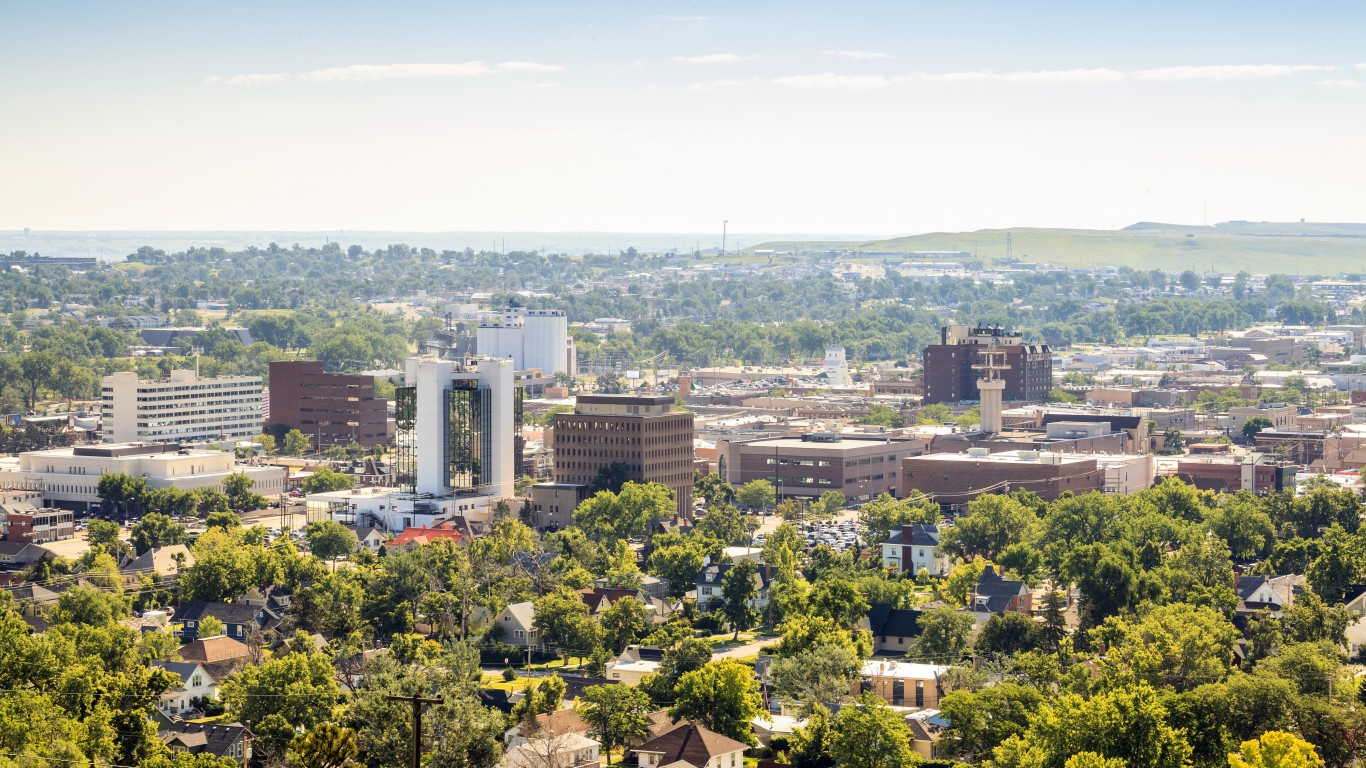
2. South Dakota
> Vaccines distributed per 100,000: 46,662
> Vaccinations administered as pct. of population: 37.0% (3rd most)
> COVID-19 cases per 100,000 residents: 11,428 (6th most)
> Population: 882,235

1. Alaska
> Vaccines distributed per 100,000: 58,403
> Vaccinations administered as pct. of population: 41.0% (most)
> COVID-19 cases per 100,000 residents: 8,092 (15th fewest)
> Population: 737,438
These are all the counties in Alaska where COVID-19 is slowing (and where it’s still getting worse).
Click here to see all coronavirus data for every state.
Credit card companies are handing out rewards and benefits to win the best customers. A good cash back card can be worth thousands of dollars a year in free money, not to mention other perks like travel, insurance, and access to fancy lounges. See our top picks for the best credit cards today. You won’t want to miss some of these offers.
Flywheel Publishing has partnered with CardRatings for our coverage of credit card products. Flywheel Publishing and CardRatings may receive a commission from card issuers.
Thank you for reading! Have some feedback for us?
Contact the 24/7 Wall St. editorial team.